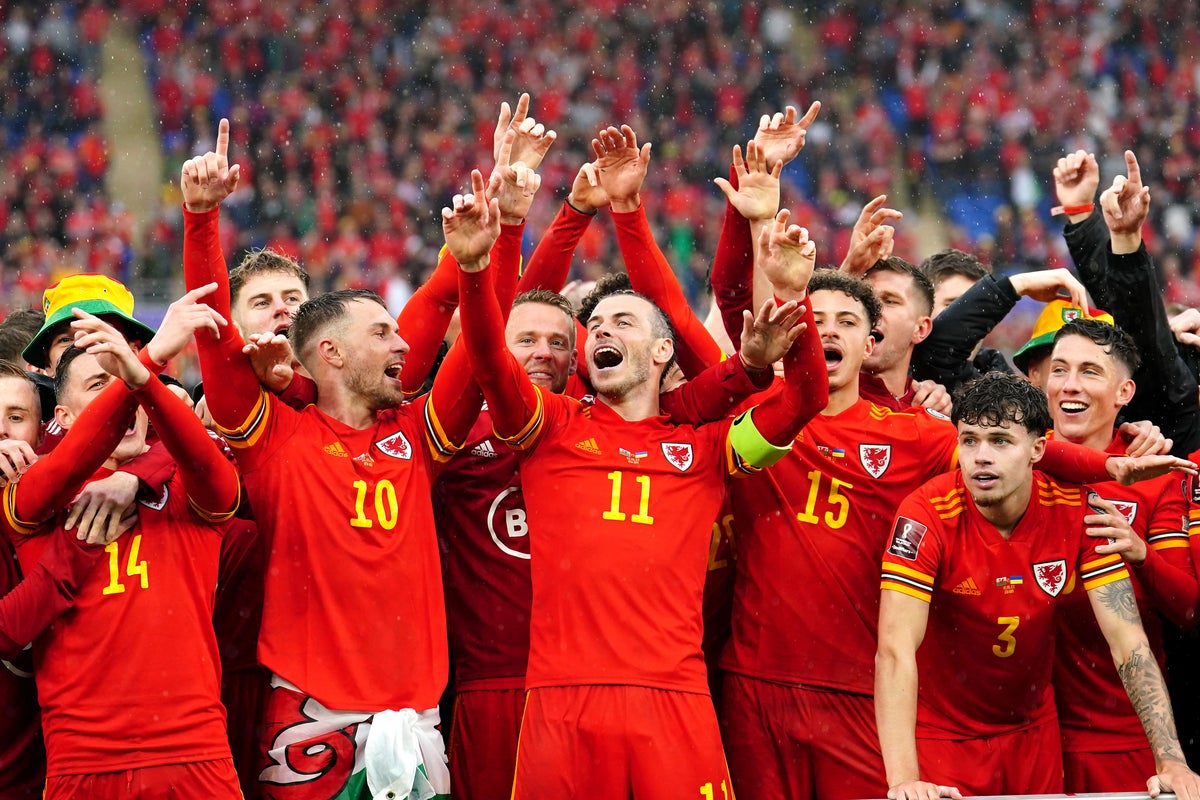
Look out for the bucket hats and wait for ‘Yma o Hyd’ to stir the soul. Wales are back at the World Cup.
It may have taken 64 years – the longest gap for any nation between successive appearances in the finals – but Wales have rejoined FIFA’s party and plan to enjoy the ride in Qatar.
Back in 1958, the football landscape was unrecognisable to the one driven by mass media and million-pound contracts today.
Sweden hosted the only World Cup to feature all four home nations, and Pele announced himself in spectacular style as Brazil won the first of their record five titles.
Wales would rue Pele’s presence as the 17-year-old settled their Gothenburg quarter-final with a second-half winner.
But, sometimes, the more things change the more they stay the same.
Wales’ manager in Sweden was Jimmy Murphy, Matt Busby’s trusted assistant at Manchester United who had missed the Munich Air Disaster four months earlier as he was away taking charge of his country.
Murphy came from the mining village of Pentre. Current boss Robert Page shares the same Rhondda roots, his childhood home in Tylorstown less than four miles from Murphy’s birthplace.
Over six decades ago Wales had a great talisman on the field in John Charles, who missed the Brazil game through injury after Hungary had cynically targeted him during their first-round play-off match.
Gareth Bale holds that role today having scored 40 goals – the most for Wales’ men’s team – in 108 appearances. Even at the age of 33 and with limited game-time at club level in recent years, Bale is still capable of match-winning moments on the biggest of stages.
Just like in 1958, Wales needed a play-off to book their World Cup place this time around, and it was Bale who was the difference in games against Austria and Ukraine.
The former Real Madrid star, now Stateside and having just won the MLS Cup at Los Angeles FC, scored three times in 2-1 and 1-0 wins as Wales, with a population of around 3.1million, became the smallest country to qualify for the 2022 World Cup.
If Euro 2016 and an incredible run to the semi-finals changed Welsh football culture forever, reaching Qatar has moved it on several different levels.
Dafydd Iwan’s ‘Yma o Hyd’ anthem is Wales’ official World Cup song having been sung at recent matches, and football has played a huge role in the renaissance of Welsh culture and language.
“In spite of everyone and everything, we are still here,” runs the chorus, a line used by actor Michael Sheen in a TV speech that went viral and introduced a wider UK audience to a growing Welsh identity.
So much so that the Football Association of Wales is to consider changing the name of its national teams to Cymru – the Welsh name for Wales – on the international stage after the World Cup.
While that debate is for another day, around 3,000 Wales fans – many of them wearing the yellow, red and green bucket hat that has become a symbol of Welsh football culture – are heading to Qatar for group games against England, Iran and the United States.
According to FIFA rankings, it is the most competitive of the eight groups – the only one with all four teams inside the world’s top 20.
Bale’s fellow Euro 2016 survivors – Aaron Ramsey, Joe Allen, Ben Davies and Wayne Hennessey – should play key roles in Doha.
Hennessey, the hero of June’s play-off final victory against Ukraine, is expected to get the nod over Danny Ward, another Euro 2016 survivor, in goal.
Page, who will become the first man to lead Wales at two major tournaments after steering them to the last 16 of Euro 2020, prefers a 3-4-3 formation, with Ethan Ampadu, Joe Rodon and Davies the likely central defenders.
Connor Roberts and Neco Williams operate as the wing-backs and provide huge drive and energy.
Ampadu is a midfield option, especially if hamstring victim Allen loses his fitness battle, alongside Ramsey.
Page has to find a way to fit his attacking talents into a system that works best.
Bale, Daniel James and Kieffer Moore offer a variety of experience, guile, pace and physical power, while Brennan Johnson has also showed that he looks comfortable on the international stage.
Wales topped their group at Euro 2016 when finishing above England and were runners-up to Italy at Euro 2020.
Advancing to the knockout stage – and a round-of-16 date against potentially Holland or Senegal – is achievable, but Page will not look further than the United States on November 21.
Iran are next up four days later before a third game at the Ahmad Bin Ali Stadium against England on November 29.
Whatever happens, there will be no repeat of 64 years ago when Wales’ players returned to Swansea train station a day after playing Brazil.
Cliff Jones, Terry Medwin and others told the story of how a conductor, spotting their suitcases, asked where they had been on their holidays.
The Class of 2022 are already national heroes, determined to prove Wales’ long World Cup absence has been worth the wait.







